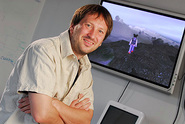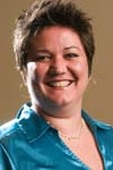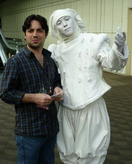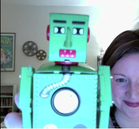Jay David Bolter, Professor

I hold the Wesley Chair in New Media and am the Co-Director of the Wesley Center for New Media Research and Education. I also direct the Writing Program (Freshman Writing and Technical Communication) in the School of Literature, Communication, and Culture in the Georgia Institute of Technology. I teach in our M.S. program in Information Design and Technology and our undergraduate program in Media Studies. My research areas include:
Augmented Reality and Dramatic Experiences: Prof. Blair MacIntyre,Maribeth Gandy, and I are creating a design environment called DART and using that environment to foster the creation of informal education, artistic expression and entertainment.
Digital Art and Design: Prof. Diane Gromala and I have written a book entitled Windows and Mirrors, published by MIT Press (Fall, 2003), in which we explore the significance of digital art for the digital design community at large.
Media Theory: I study how new (digital) media affect and are affected by earlier media and media forms, including film, television, and print.
Augmented Reality and Dramatic Experiences: Prof. Blair MacIntyre,Maribeth Gandy, and I are creating a design environment called DART and using that environment to foster the creation of informal education, artistic expression and entertainment.
Digital Art and Design: Prof. Diane Gromala and I have written a book entitled Windows and Mirrors, published by MIT Press (Fall, 2003), in which we explore the significance of digital art for the digital design community at large.
Media Theory: I study how new (digital) media affect and are affected by earlier media and media forms, including film, television, and print.
Blair MacIntyre, Professor

I have been a faculty member in the Georgia Tech College of Computing and the GVU Center since January 1999, after finishing a PhD in the Department of Computer Science at Columbia University in New York City. I direct the Augmented Environments Lab, whose research focuses on the design and implementation of interactive mixed-reality and augmented-reality environments. The current focus of my work is educational, entertainment and gaming applications of augmented and mixed reality environments, especially those that use personal displays (ie. ranging from see-through head-worn displays to video-mixed handheld displays) to directly augment a user's perception of their environment.
My current projects focus on handheld AR games, distributed collaboration using mixed reality and virtual worlds, and mirror worlds as a platform for hybrid AR/VR experiences and applications.I work with a broad range of technology as appropriate for the experience, including handheld, headworn, projection and auditory displays. Beyond entertainment applications, I have worked on industrial applications of augmented reality with researchers in the GTRI Food Processing Technology Division.
In my research, I look at both task-focused and experiential systems, and blend elements of augmented and mixed-reality, ubiquitous computing, tangible media and wearable computing. My research addresses various computing issues (including human-computer interaction, computer graphics, computer systems, and software engineering) and design issues (including new media design theory, and tools and theories of design for new media) encountered during the design and implementation of augmented environments. The activities of my research include both the exploration and design of prototype applications, as well as the design and implementation of interaction techniques and user-interface software architectures to enable their deployment.
I am involved with numerous conferences and workshops, and have been a Program Committee Chair for ISWC 2000 (International Symposium on Wearable Computing), ISMAR 2003 (International Symposium on Mixed and Augmented Reality), and UIST 2003 (The ACM Symposium on User-Interface Software and Technology). I am on the editorial boards of The International Journal of Human-Computer Studies and the journal Virtual Reality. I have served as the guest editor (with Mark Livingston at NRL) of a "Mixed Reality" special issue of IEEE Computer Graphics and Applications.
My current projects focus on handheld AR games, distributed collaboration using mixed reality and virtual worlds, and mirror worlds as a platform for hybrid AR/VR experiences and applications.I work with a broad range of technology as appropriate for the experience, including handheld, headworn, projection and auditory displays. Beyond entertainment applications, I have worked on industrial applications of augmented reality with researchers in the GTRI Food Processing Technology Division.
In my research, I look at both task-focused and experiential systems, and blend elements of augmented and mixed-reality, ubiquitous computing, tangible media and wearable computing. My research addresses various computing issues (including human-computer interaction, computer graphics, computer systems, and software engineering) and design issues (including new media design theory, and tools and theories of design for new media) encountered during the design and implementation of augmented environments. The activities of my research include both the exploration and design of prototype applications, as well as the design and implementation of interaction techniques and user-interface software architectures to enable their deployment.
I am involved with numerous conferences and workshops, and have been a Program Committee Chair for ISWC 2000 (International Symposium on Wearable Computing), ISMAR 2003 (International Symposium on Mixed and Augmented Reality), and UIST 2003 (The ACM Symposium on User-Interface Software and Technology). I am on the editorial boards of The International Journal of Human-Computer Studies and the journal Virtual Reality. I have served as the guest editor (with Mark Livingston at NRL) of a "Mixed Reality" special issue of IEEE Computer Graphics and Applications.
Michael Nitsche, Professor

I work as an Associate Professor at the School of Literature, Communication & Culture(LCC) at the Georgia Institute of Technology, where I teach courses mainly for theDigital Media Masters and PhDs, as well as for the Computational Media undergrad program. I am founder and Director of the Digital World & Image Group (DWIG), which is the home for all my current projects. Some of our work is done in the Experimental Game Lab of which I am the Associate Director.
I am a co-founder of the Digital Performance Initiative at Georgia Tech, an interdisciplinary group of scholars that look into the interconnection of Performance Studies and digital media. Within Georgia Tech, I am active member of a number of interdisciplinary centers and groups, these include the Graphics, Visualization & Usability Center (GVU), the Responsive Objects, Surfaces, and Spaces (ROSS) initiative, and the Georgia Tech Center for Music Technology (GTCMT).
My main research interest are digital spaces. These include real-time 3-dimensional virtual environments as well as the physical locations where we engage with digital media. I am interested in the way virtual and real spaces shape each other. Together with some colleagues I run a blog, Freepixel, and I am Co-chair of the DiGRA Special Interest Group on 'Games and Film' (with Diane Carr). The SIG had a first home on this blog. I have been collaborating with a variety of academic and commercial partners on different research projects: Sony Computer Entertainment Europe (SCEE), the Centre for Applied Research in Educational Technologies (CARET) in Cambridge, Alcatel-Lucent, the Georgia Tech Broadband Institute, as well as game developers Funatics, and EA'sTiburon. Currently my work is supported by the National Science Foundation, the GVU, and Google.
I hold an MA in Drama and German language from the Freie Universitaet Berlin. The final thesis was about writing screenplays for interactive environments. I did a MPhil in Architecture and the Moving Image at the University of Cambridge with a final thesis on 'The Architecture of Interactive Storytelling.' Finally, I finished my PhD in 2004 on 'Virtual Story Spaces' also at the University of Cambridge (Darwin College). You can find a one page summary of my thesis here. A completely re-worked version of the thesis was the basis of my first book 'Video Game Spaces. Imagery, Play, and Structure in 3D Worlds' (MIT Press, spring 2009).
If not immersed in some digital adventure I am collecting screenplays. In a former lifetime, I gathered some experience in independent film production, scriptwriting, and even before that I worked as Improv actor for some years at the Fast Food Theater, Munich. I also co-wrote the script for the commercial computer game Zanzarah. More currently, I am getting more and more fascinated by puppets.
Melissa Foulger, Artistic Director of DramaTech

Melissa Foulger is the Artistic Director of DramaTech, Georgia Tech’s student run
theatre. Previously, she was an Visiting Professor in the Department of Music and
Theatre at Georgia College & State University in Milledgeville, GA and Associate Artistic
Director for 7 Stages.
Professionally, Ms. Foulger has directed throughout the Atlanta area at theatres such
as 7 Stages, Actor’s Express, Dad’s Garage and Synchronicity Performance Group. Her
productions of Suddenly Last Summer and Far Away have garnered Top Director nods
from both Creative Loafing and The Sunday Paper.
Ms. Foulger attended The George Washington University where she received a B.A. in
Theatre and an M.Ed. in Secondary Education. She also holds an M.F.A. in Directing from the University of Memphis.
She was a recipient of the TCG New Generations Program: Mentoring the Leaders of Tomorrow from 2002-2004 and has
participated in both La Mama ETC’s International Directing Symposium held in Umbria, Italy and the Dah Teatar’s
International School for Directors and Actors held in Belgrade, Serbia and Montenegro.
theatre. Previously, she was an Visiting Professor in the Department of Music and
Theatre at Georgia College & State University in Milledgeville, GA and Associate Artistic
Director for 7 Stages.
Professionally, Ms. Foulger has directed throughout the Atlanta area at theatres such
as 7 Stages, Actor’s Express, Dad’s Garage and Synchronicity Performance Group. Her
productions of Suddenly Last Summer and Far Away have garnered Top Director nods
from both Creative Loafing and The Sunday Paper.
Ms. Foulger attended The George Washington University where she received a B.A. in
Theatre and an M.Ed. in Secondary Education. She also holds an M.F.A. in Directing from the University of Memphis.
She was a recipient of the TCG New Generations Program: Mentoring the Leaders of Tomorrow from 2002-2004 and has
participated in both La Mama ETC’s International Directing Symposium held in Umbria, Italy and the Dah Teatar’s
International School for Directors and Actors held in Belgrade, Serbia and Montenegro.
Evan Barba, PhD Student

I am a PhD student in Human-Centered Computing. My research focuses on understanding the design methodologies for creating compelling mobile AR experiences, and defining the criteria to evaluate their effectiveness. Now that mobile devices are powerful enough to enable AR content it is important to understand how these devices can be effectively leveraged to mediate our experiences of the real world in context-specifc ways. Some of the questions I am interested in are: How do multiple users coordinate their activities in the physical and virtual worlds? What are the cognitive strategies users employ to make sense of these experiences? How do you design in this medium to generate specific meanings for users or to allow for a multiplicity of user-generated meanings?
Currently, I am looking at tabletop handheld AR games and the unique interaction styles they afford. Previously I co-created the mobile mixed reality game experience Public Space Invaders, which allowed users to play a 50ft tall version of the classic arcade game projected on the side of a building using only their body movements as controls. The project was intended to use AR technology to challenge traditional notions of how public space is used by coopting architectural structures for unintended purposes.
Currently, I am looking at tabletop handheld AR games and the unique interaction styles they afford. Previously I co-created the mobile mixed reality game experience Public Space Invaders, which allowed users to play a 50ft tall version of the classic arcade game projected on the side of a building using only their body movements as controls. The project was intended to use AR technology to challenge traditional notions of how public space is used by coopting architectural structures for unintended purposes.
Rebecca Rouse, PhD Student

Rebecca Rouse is PhD student in digital media at The Georgia Institute
of Technology, where she is a member of the Digital Performance
Initiative, led by Professor Jay Bolter. Her research focuses on uses
of hybrid media in performance. Rouse has an MA in Communication and
Culture from York University and a BA in Theater and German from Brown
University. She has a background in theater as a director and
playwright, and has studied at La MaMa Experimental Theater Company.
of Technology, where she is a member of the Digital Performance
Initiative, led by Professor Jay Bolter. Her research focuses on uses
of hybrid media in performance. Rouse has an MA in Communication and
Culture from York University and a BA in Theater and German from Brown
University. She has a background in theater as a director and
playwright, and has studied at La MaMa Experimental Theater Company.
